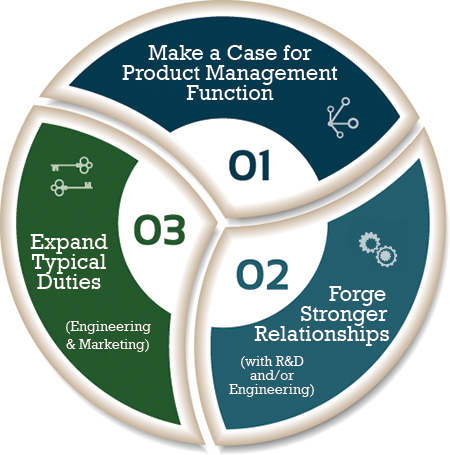Why Healthcare Organizations Need Product Management
I’ve been speaking with quite a few healthcare clients, and a surprising fact has emerged – many healthcare organizations (particularly in the payer and device/diagnostic segments) lack a true product management function.
Why is this? Here are some possible root causes:
- Product strategy may be led by research and development (R&D) or engineering, particularly within the device, diagnostic and pharmaceutical space. In these cases, product innovation relies on scientific discovery, which is often outside a product manager’s scope.
- Senior management has determined the strategy for market entry. Because of the complexity of the healthcare industry, strategic decisions around growth objectives are often made at the executive level, leaving less room for product management to exert influence.
However, without a true product management function, even healthcare organizations with clear strategic direction are apt to have downstream challenges.
Here are four of the top challenges:
- No formal analysis or validation of the market opportunity is completed. Without a formalized process for approving business cases or executing concept testing, executive leadership may be surprised when a new product’s market entry does not deliver robust or immediate sales. Often, the first explanation for the gap involves marketing, even if that team was not involved in the strategic identification of the target market.
- Knowledge of competitors is lacking. Since an essential part of product management’s role is to keep a finger on the pulse of competitive offerings, duplicative, unnecessary or sub-optimal products may emerge in the absence of a product management function.
- The base content available to marketers is weak. Let’s face it – engineers don’t focus on the quality of their writing for a good reason; content developed by engineers tends to be exceedingly technical and of minimal use to marketers.
- Product or service optimization does not occur. Without a strong product management champion to control or heavily influence the financial success of the product, enhancement initiatives can fall into technical bug/fix category or be subject to the whims of the visionary executive.
In the face of these challenges, what should a strategically inclined healthcare marketer do? Of course, the appetite of the specific organization determines the approach, but here are a few suggestions:
 Make the case for a product management function. By instituting a formal product management function, healthcare organizations can close the gaps discussed above.
Make the case for a product management function. By instituting a formal product management function, healthcare organizations can close the gaps discussed above.
- If no additional headcount is available, identify areas where engineering and marketing can expand their typical duties. Although the product management function doesn’t exist formally, certain activities must take place. Marketing and engineering may already be covering some of the responsibilities typically owned by product management, but gaps may exist. Would marketing agree to do some market analysis to identify strategic opportunities? Would the R&D group share what it knows about other products that have been brought to market?
- Forge stronger relationships with R&D and/or engineering. Several strategic leaders within these functions can serve as a bridge between the technical product information and the audience-centric content that sales needs. The marketing team should use these strategic thinkers as thought leaders and sounding boards as they develop market-facing content.
Product managers are the strategic partners of healthcare marketers. In their absence, strong marketers must determine how these essential functions can be fulfilled, so new product and service offerings can be matched to market needs and buying cycles.
